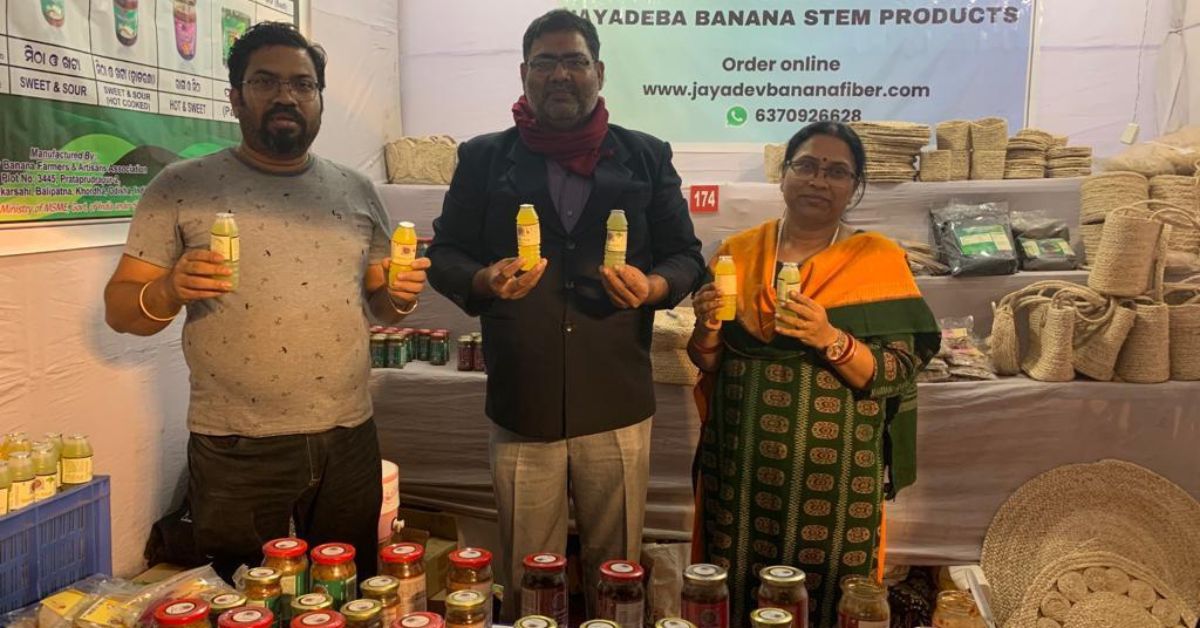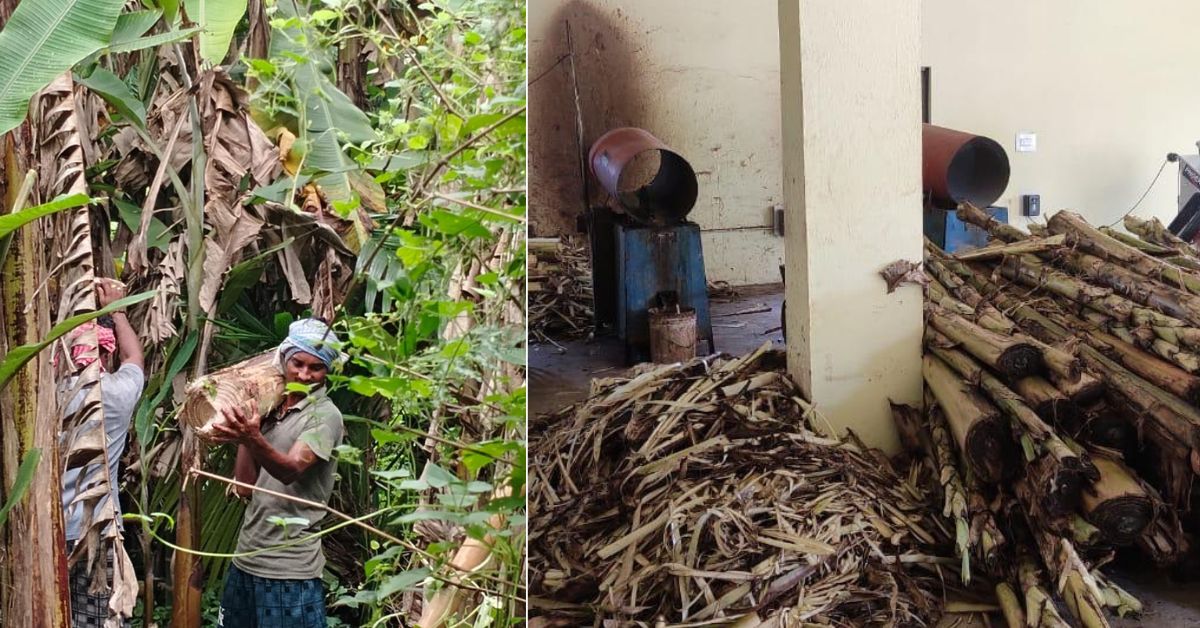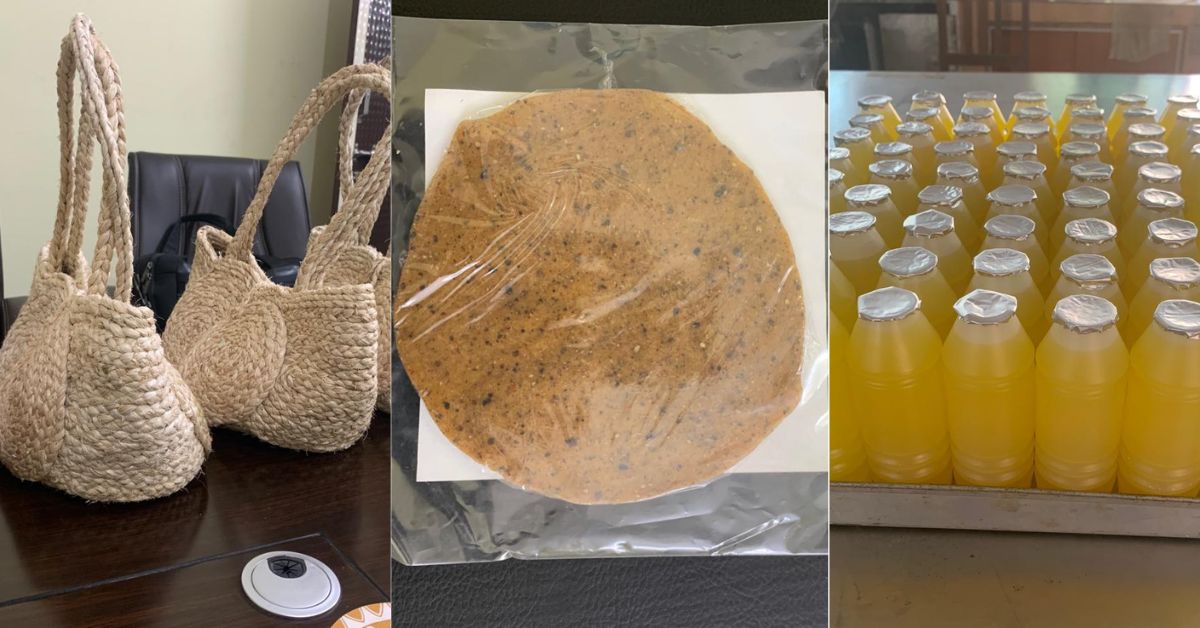In Odisha’s Khordha district, banana is a major commercial crop alongside paddy, pulses, and oilseeds. While it significantly boosts the agricultural economy, it also poses challenges in managing post-harvest waste.
Until two years ago, Anil Kumar Mallick would pile post-harvest banana waste in a corner of his field. Pressed for time to prepare the land for the next sowing season, he often resorted to burning it. This process not only consumed an entire day but also came with additional costs.
“After harvesting the fruit, we had to clear the leftover waste, which meant spending up to Rs 2,000 a day on labour,” Anil recalls.
For Anil, this post-harvest waste was nothing but a hassle — until 2021, when he met Anusuya (46) and Kasinath Jena (52).

The couple runs the ‘Jayadev Banana Farmers and Artisans Association’ — an initiative based out of Balipatna — that upcycles banana waste into food and utility items, such as banana stem pickles, papad, jam, ropes, mats, and coasters. Remarkably, the facility operates on a zero-waste model by converting leftovers into vermicompost and biochar.
This initiative has transformed the lives of at least 1,000 farmers like Anil. They now enjoy dual benefits: free clearing of their fields for the next crop and an additional income from waste.
“I earn Rs 80 for each plant I sell. Altogether, I make Rs 40,000 annually just by selling what used to be waste for me,” shares Anil, who grows around 500 banana plants on his two-acre plantation.
Identifying the problem
For the past 30 years, Kasinath Jena has worked as a development consultant, focusing on building rural enterprises and creating livelihoods for underprivileged communities. The idea of turning banana waste into wealth struck him during a visit to his village in Balipatna block, Khordha district, in 2020.
“A large number of people here grow bananas, and almost every household has a banana plant in their backyard. When I spoke to a few farmers, I realised that managing post-harvest waste was a major challenge for them,” he recalls.

In many agricultural regions, the post-harvest disposal of agricultural byproducts poses significant challenges. This is particularly true for banana plantations, where the volume of waste generated after harvesting can be substantial.
Farmers often face the arduous task of managing this waste, including labour-intensive disposal methods, potential environmental concerns, and the significant financial burden of hiring workers to clear the field.
Traditionally, this waste was often simply burned or left to rot, contributing to environmental pollution and posing a significant time commitment for farmers.
Enter… a waste-to-wealth solution
Encouraged to fix this problem, Kasinath started researching more on banana waste. His quest took him to Maharashtra, Andhra Pradesh, and Tamil Nadu.
“Here, I saw a couple of farmers extracting fibre from banana stems. I also learnt that tribal people utilise the innermost core called the floral stem to make food items. This part is edible. So, I wondered why not experiment with it,” he shares.
It took Kasinath a year to experiment with the products. Finally, he set up Jayadev Banana Farmers and Artisans Association in Balipatna block. Starting with 350 farmers initially, today he collects banana farm waste from at least 1,000 farmers.
The operational model of this initiative is relatively straightforward. The collection vehicle visits designated plantations on a regular schedule, collecting the waste. At their Common Facility Centre, which is equipped with the necessary machinery, this waste is processed into various products across three categories — food, agricultural, and utility items.
Overall, there are more than 100 items made from banana waste — such as stem pickles, juice, banana stem pulp laddu, papad, and badi (dried dumplings); handicrafts such as purses and coasters; biochar made out of banana leaf waste to boost soil fertility; and much more.

In a month, the organisation converts about 300 tonnes of banana waste into useful products. Through offline and online markets and exhibitions, Kasinath has established a market for the products in various districts of Odisha, West Bengal, Chhattisgarh, and Andhra Pradesh.
Anusuya travels 25 km from her home in Bhubaneswar to the facility every morning to oversee daily operations. “We have a CCTV camera, but the team still needs guidance and monitoring. I also meet delegates and visitors at the centre. I don’t earn an income from this; our goal is simply to help our farmer brothers earn extra income,” says Anusuya, the president of the association.
She adds, “My husband and I have been working in the social development sector for over two decades, focusing on human rights. We were inspired to take up initiatives that boost the income of rural residents.” Besides her role in the association, Anusuya also works as a translator.
This innovative approach not only addresses the waste problem but also generates additional income for farmers. Currently, at least 1,000 farmers across Kordha, Cuttack, and Puri districts of Odisha are reaping the benefits of the association.
“This approach provides a valuable template for rural development and demonstrates the potential of waste-to-wealth initiatives in promoting sustainable agricultural practices and improving the livelihoods of rural communities,” says Kasinath.
“For every stem, we give Rs 70-80 to a farmer. By collecting waste from farm sites, we clean their field. This indirectly helps them as it saves them labour costs. On average, a farmer associated with us earns an additional Rs 7,000 to Rs 10,000 for banana waste,” he adds.
The initiative’s impact extends beyond the economic realm. “By removing banana waste from the fields, this approach contributes to a cleaner environment. The elimination of open burning prevents air pollution and mitigates the risk of soil contamination,” he adds.
For Kasinath, this work is purely selfless.
“This is an association of farmers. Around 40 people are employed here to handle the processing work, and they earn a salary from the profits. I don’t take any share of the earnings — I sustain myself through my consultancy work,” he says, adding, “This is my way of contributing to the betterment of society and supporting my farmer brothers.”
Edited by Pranita Bhat; All photos courtesy Kasinath Jena
No comments:
Post a Comment